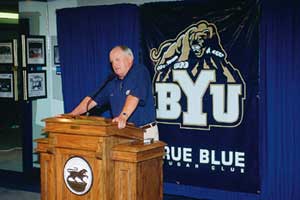By Jeff Call, ’94
To begin to comprehend and appreciate what LaVell Edwards—who on August 17 announced he will retire after the 2000 football season—has accomplished in his nearly three decades as head coach at Brigham Young University, jump into a time machine and set the clock back to Sept. 16, 1972.
Cougar Stadium consists of a few bleachers and a grass field. A sparse crowd looks on. That lumpy, brown-haired, 41-year-old man standing on the sidelines—his arms folded, mouth scowling, sideburns stretching to his ear lobe—is coaching his first game as a collegiate head coach. BYU defeats Kansas State, 32–9.
Surely, the fans are thinking, this is simply a case of beginner’s luck. This Edwards guy, an Orem native and former Utah State lineman, didn’t have one winning season in his eight years at Granite High School in Salt Lake City. Meanwhile, the Cougars have never been to a bowl game. Ever. They’ve won only one conference championship. Plus, Edwards has been talking nonsense. Wacky ideas about throwing the football—who can win throwing the football?—and about actually playing with aging returned missionaries.
Surely, this guy will soon be headed to the unemployment line. Doesn’t he know that in the previous 30 years the Cougar football team has gone through five coaches and won an average of less than three games per season?

On August 17, head football coach LaVell Edwards announced his plans to retire after the 2000 season.
Jump back into the time machine and set it for fall 2000. Twenty-nine seasons later, Cougar Stadium is filled with 65,000 fans. The game is being televised nationally. That same lumpy, gray-haired man is 70 and standing on the sidelines—his arms folded, mouth scowling, sideburns gone—watching his team win yet again. Edwards has won 250-something games, though most fans have lost track. All they know is that only a select few in the history of college football, like Paul “Bear” Bryant and Pop Warner and Joe Paterno, have won more.
They also know that this is Edwards’ final season at the helm. They reminisce about his string of All-America quarterbacks, including Heisman Trophy winner Ty Detmer. They are aware of his two National Coach of the Year honors (in 1979 and 1984), his 20 conference titles, his 22 bowl appearances, his 13 top-25 finishes, and, of course, his 1984 national championship. Mostly, though, they recall the heart-stopping comebacks, the unforgettable victories.
No, Edwards never threw a touchdown pass or threw a block for the Cougars since he joined the team as an assistant coach in 1962. But after all these years, players, assistant coaches, athletic directors, and school presidents have come and gone. The only constant is Edwards. He’s seen countless changes, but he didn’t change much.
Last January Edwards, together with his wife, Patti, decided it was time to retire. The tough part was deciding when to go public with the news. He had always believed he would finish his last season and then announce his retirement, not the other way around. However, having grown weary of the speculation about his future, Edwards felt that his assistant coaches, players, and recruits deserved to know his intentions.
Once he steps down, Edwards will remain at BYU, working with President Merrill J. Bateman and the President’s Office to strengthen the BYU sports program. Complying with Edwards’ wishes, BYU is focusing on the season at hand and is not discussing the search for a new coach.
Ask him what coaching accomplishment he’s proudest of, and Edwards doesn’t point to a singular moment. “Football game day is a major happening like it is at other universities,” he says. “That gives me as much satisfaction as anything. I like the fact that football is important at BYU.”
And yet his impact has gone far beyond football. “LaVell Edwards,” says President Bateman, “has meant so much to Brigham Young University with regard to helping people understand who we are and what we’re about because of the kind of person he is, because of the team that he fields, because of the exciting game that he plays. It’s been the best 30 years of BYU it could possibly be. And LaVell Edwards has played an enormous role. He’s been a giant of a man.”






